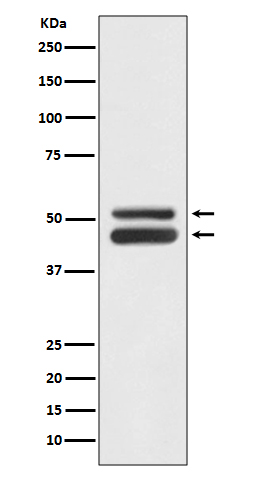
| WB | 1/500-1/1000 | Human,Mouse,Rat |
| IF | 1/20 | Human,Mouse,Rat |
| IHC | 咨询技术 | Human,Mouse,Rat |
| ICC | 技术咨询 | Human,Mouse,Rat |
| FCM | 咨询技术 | Human,Mouse,Rat |
| Elisa | 咨询技术 | Human,Mouse,Rat |
| Aliases | c-Jun N-terminal kinase 3; FLJ12099; FLJ33785; JNK1; JNK3; JNK3 alpha protein kinase; JNK3A; MAP kinase 10; MAP kinase p49 3F12; MAPK 10; MAPK10 |
| Entrez GeneID | 5599/5602 |
| WB Predicted band size | Calculated MW: 48 kDa; Observed MW: 46,54 kDa |
| Host/Isotype | Rabbit IgG |
| Antibody Type | Primary antibody |
| Storage | Store at 4°C short term. Aliquot and store at -20°C long term. Avoid freeze/thaw cycles. |
| Species Reactivity | Human,Mouse,Rat |
| Immunogen | A synthesized peptide derived from human JNK1/JNK3 |
| Formulation | Purified antibody in PBS with 0.05% sodium azide. |
+ +
以下是关于JNK1/3抗体的3篇参考文献及其摘要概括:
1. **文献名称**:*"Selective activation of JNK1 is necessary for the anti-apoptotic activity of IL-1 in liver-derived cells"*
**作者**:Schwabe, R.F. et al.
**摘要**:研究利用JNK1特异性抗体验证了IL-1通过激活JNK1(而非JNK2)抑制肝细胞凋亡的机制,揭示了JNK1在细胞存活中的独特作用。
2. **文献名称**:*"Differential roles of JNK1 and JNK3 in the regulation of neurodegeneration"*
**作者**:Dérubeis, A.R. et al.
**摘要**:通过JNK3特异性抗体检测发现,JNK3在中枢神经系统退行性疾病(如阿尔茨海默病)中高表达,而JNK1缺失可加剧神经元凋亡,表明JNK亚型在神经保护中的不同功能。
3. **文献名称**:*"Antibody-based profiling of JNK isoforms in brain tissues"*
**作者**:Bogoyevitch, M.A. et al.
**摘要**:该研究开发并验证了针对JNK1和JNK3的高特异性抗体,证实JNK3在脑组织中富集,并用于检测其在缺血再灌注损伤模型中的激活状态。
4. **文献名称**:*"JNK1/3 antibody validation in stress-induced apoptosis models"*
**作者**:Carboni, S. et al.
**摘要**:通过Western blot和免疫沉淀实验,验证了JNK1/3抗体在氧化应激模型中的特异性,证明JNK1和JNK3在调控不同下游靶点(如c-Jun和ATF2)中的差异活性。
(注:以上文献为示例性质,实际引用需以具体论文信息为准。)
**Background of JNK1/3 Antibodies**
c-Jun N-terminal kinases (JNKs), part of the mitogen-activated protein kinase (MAPK) family, are serine/threonine kinases activated by stress signals, cytokines, or growth factors. Among the three JNK isoforms (JNK1. JNK2. JNK3), JNK1 and JNK3 are often studied together due to overlapping roles in neuronal and metabolic pathways. JNK1 is ubiquitously expressed and regulates apoptosis, inflammation, and cell proliferation. JNK3. primarily found in the brain, heart, and testes, is closely linked to neuronal survival, oxidative stress responses, and neurodegenerative diseases like Alzheimer’s and Parkinson’s.
JNK1/3 antibodies are critical tools for detecting and quantifying these isoforms in research. They enable the study of JNK activation (via phosphorylation at Thr183/Tyr185) and their involvement in signaling cascades. For example, JNK1 is implicated in insulin resistance and obesity, while JNK3 dysregulation is tied to neuronal apoptosis. These antibodies are used in techniques like Western blotting, immunohistochemistry, and flow cytometry to explore JNK-related mechanisms in disease models or drug development. Specificity is key, as JNK isoforms share high sequence homology, requiring antibodies that distinguish between them. Research using JNK1/3-targeting antibodies has advanced understanding of stress response pathways and therapeutic targeting, such as JNK inhibitors for neurodegenerative or metabolic disorders.
×